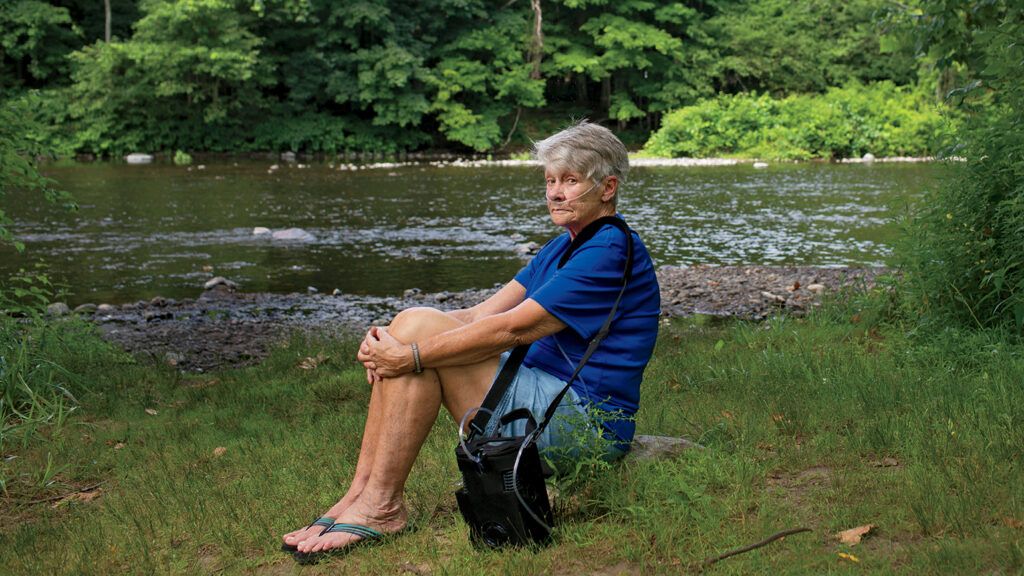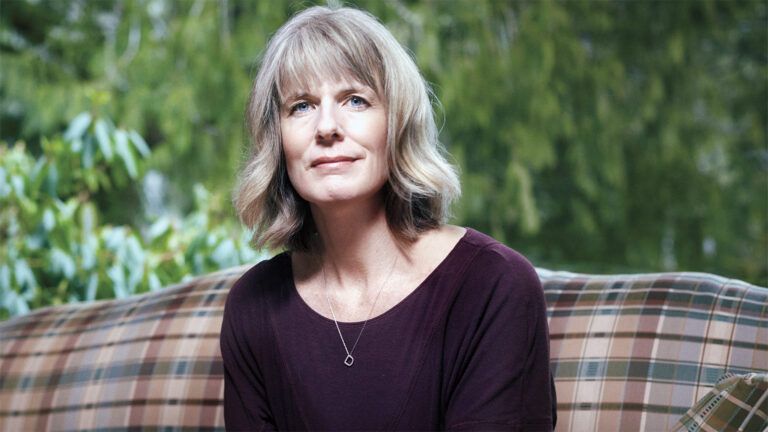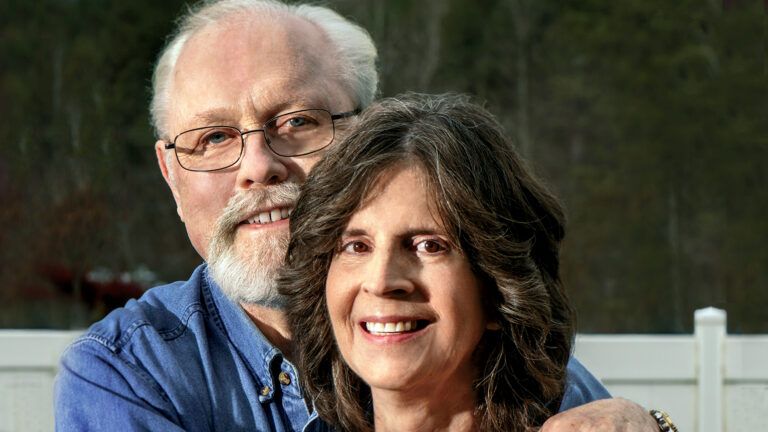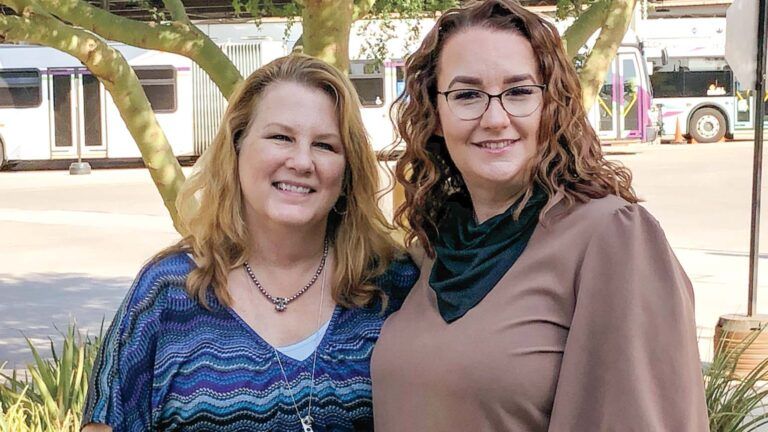I couldn’t take it anymore. the constant fatigue. The muscle weakness. Needing everyone to care for me. I was supposed to be the strong one. The mother. The woman who helped everyone else. Anger burned inside me. I had to get out of the house. It was a beautiful night. The Farmington River ran nearby—only 300 feet away. It might as well have been miles. What used to take me seconds dragged on for nearly 15 minutes as I walked step by step from my back door. I was exhausted from radiation treatment for lung cancer, and my COPD made it difficult to catch my breath. I felt emotionally and physically spent. Even if I beat cancer, COPD was a life sentence, a disease without a cure.
I collapsed onto the rocky shore. Why me, God? Why are you cutting my life short after I’ve served you all these years? All the resentment that had been building since my diagnosis exploded. “I’m not ready to die!” I shouted to the river, but I was really talking to God. Where was my miracle? I picked up a stone and threw it as far as I could into the water.
I’d seen God perform miracles while serving as a medical missionary for such organizations as Kids First, Red Cross and FaithCare. We’d escaped bullets in Rwanda after the ethnic cleansing. In the 1990s, we’d saved lives in Haiti, Sri Lanka and Guatemala. I’d been at it for 25 years—and loved every second—until it came to a screeching halt in 2016.
The year before, I’d been working with Kids First at a children’s orthopedic surgery clinic in San Miguel de Allende, Mexico, when one day I noticed myself getting winded. I was walking uphill, and we were more than 6,000 feet above sea level. It was hot and humid. I’d been on my feet for 16 hours straight. I was 74 years old. Of course I was winded!
Still, it bothered me enough that I called my internist when I got home.
“I’ve been having trouble catching my breath,” I said.
She knew I’d been a smoker for 50 years. What did I expect? I’d started my pack-a-day habit back in my twenties. Everybody smoked in the 1960s—it was a social thing. I smoked all through raising four kids on my own after their father and I divorced. I’d worked grueling shifts as an ICU nurse. Had smoking really caught up with me?
“Let’s try putting you on Wellbutrin,” she said. “It helps people quit. Then we’ll reevaluate.” Trying to quit smoking was just about the hardest thing I’d ever done. If my internist could have sent me to an inpatient rehab clinic, I would’ve gone. Nicotine is a highly addictive drug. It took me nearly six months to kick the habit. Then my internist sent me for a chest X-ray and to a pulmonologist to measure my lung function.
Remember I’m a nurse, so I knew immediately something was wrong from the way the pulmonologist, Dr. Omar Ibrahim, looked at me afterward. “We’ll need to do a CT scan.”
That was followed by a biopsy. Finally Dr. Ibrahim sat beside me in his office. His manner was gentle and kind. “I’m sorry to say you have lung cancer. Since you also have COPD, we’re not sure how well you’d handle major surgery. I’d recommend radiation therapy.”
Those words took the breath out of me, what little I had. Nobody had ever diagnosed me before with COPD! Lung cancer and COPD shouldn’t have been a surprise to anyone who’d smoked the way I had, but I was in shock. I just hadn’t thought it could happen to me. Lung cancer was horrible enough, but it could be cured. The life sentence of COPD felt almost worse. I couldn’t help but feel resentful. Why me, God?
Then there were my children. I had to tell them that their strong-willed, independent mother had a chronic, terminal disease. That she would need their help. I felt pathetic—embarrassed. The following Saturday, I invited all of them over to my house for dinner and some homemade apple pie. I hoped it would cushion the blow.
“You’re probably wondering why I asked you all here tonight,” I said. “First of all, I want you all to know that I love you very—”
My oldest, John, cut me off. “Mom, what are you trying to say?”
He knew something was wrong. I’d raised my kids to have roots and wings—to be able to take care of themselves and each other. But it was so difficult to be the one who needed saving.
“I have lung cancer and COPD,” I said. “Even if radiation cures my cancer, COPD can’t be cured. It’s a progressive, degenerative disease.” I paused, angry at my own words. “I’m never getting better, and I’ll need your help.”
“Oh, Ma,” said my daughter Kristin. “I’m so sorry.”
She rushed to my side. Her siblings followed. We cried together and hugged. They all vowed to do whatever I needed.
The radiation treatments lasted six weeks. The kids took care of everything—raking leaves, laundry, cleaning house, getting me to my appointments—but I was exhausted all the time. Some days I slept for 20 hours straight. I had to wait six more months to see if the radiation was even working. For a take-action girl like me, waiting was the worst.
Even as the fog lifted and I felt a little stronger, my mind continued to spiral. It’s not fair, God. You could intervene if you wanted to. So there I was that evening, shouting at the Farmington River and throwing stones. I watched them splash into the water and disappear. I threw more stones. And more. I’m not sure how many I threw before I collapsed, pulling my knees up to my chest and sobbing. What had I done to deserve this? Why, God?
At my six-month check-up, Dr. Ibrahim said it looked as if the radiation was working on my cancer cells.
“What about the COPD?” I asked. I cringed at the ingratitude of my question.
“There are things that can help, if you are willing,” the doctor said.
He told me about a pulmonary rehabilitation program that incorporated exercises, education and other support for patients with COPD. “It teaches you to breathe and function at the highest possible level.”
I was already so depressed and exhausted from the radiation that I didn’t know how I would do as part of a program. I walked into the hospital classroom on the first day of rehab and took a chair around the table. There were six of us COPD patients and two pulmonary therapists. They gave us an outline of the program, then asked how we were feeling.
“I’m angry that I have COPD,” I said. “I’m pissed off at God.”
Out of the corner of my eye, I saw a man nod his head.
“You’re not alone in your feelings,” said the therapist. “It’s okay to be angry. God has big shoulders. He can take it. You just have to get past the anger. Improving your condition will help.”
In the weeks that followed, the therapists taught us techniques to manage COPD, such as pursed-lip breathing, and how to use an oxygen tank, control panic and exercise.
I’d never even been to a gym before. The first time I tried a treadmill, I almost flew off. Something about having the ground move really threw me for a loop. I let the therapist assist me in regaining control. Learning to accept help was still so difficult, but I knew it was necessary. With compromised oxygen levels, I had only so much energy. I had to let go. No more mission trips for me. My mission was living each day.
Anger still boiled up within me. It helped, though, that I was making good progress in rehab. One day, I walked down to the river again. Step by step. I gazed at the flowing water. I’d fed ducks and geese here with my grandkids. We’d made such great memories on this spot, memories that COPD could not take away. I was overcome with a sense of gratitude that my anger had obscured.
I’m sorry, God, I prayed. I’m not really mad at you. I’m mad at myself. I’m mad at every cigarette I ever smoked. I’m mad at this disease. Help me. There was no booming voice. No light splitting the clouds. My heart simply swelled with the sense that God was with me. He hadn’t abandoned me. It’s okay to be human, I thought. None of us are as tough as we think we are. God wants us to rely on each other, to both give and seek help. It’s okay to realize your limits. It’s not a sign of weakness but of acceptance.
I picked up a stone and gently tossed it into the water by the river’s edge. I watched the concentric ripples spread across the surface, expanding uniformly in all directions, a wave that reached everywhere.
For more inspiring stories, subscribe to Guideposts magazine.






